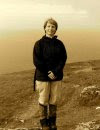A group of seven women and I are getting ready to spend a month in the UK studying the transition of Victorian literature from romanticism to modernism. Long before now people knew, "Plus ca change, plus c'est la meme chose." This is so much the case for looking at the social upheaval during the 1800s in England. Well, be fair, a lot of this stuff was fomenting in the late 1700s as well, but clean lines are hard to draw. But in the early 21st century, I think we are still enduring the same provoking issues of gender identity, disillusionment, and the iniquity of human nature that the Brontes, Byron, and even A. Conan Doyle were writing about. But why not sit in Ohio and discuss this?
Stories take place in specific settings evoking landscapes, memories, and emotions from the readers, which enhance the narrative. One of the benefits of study abroad is that students can experience the landscapes of novels and well-known story cycles thus gaining an

increased understanding of the texts. In this course, we will study texts that have come to be associated with specific landscapes in the vicinity of Harlaxton Manor and discuss the texts that have made those landscapes iconic.
In addition, the tourist industry has firmly grasped the idea of literary tourism, which is rooted in this idea of the power of place to enhance a literary experience. The commodification of famous texts through gift shops and tourist events becomes an interesting commercial literary critique.England has built an entire sub-genre of tourism based on literature. This course would explore the explicit relationship of literature with landscape through the lens of this commercial interpretation.
In this course, students will read texts associated with local landscapes, visit those landsca apes, and reflect on

the effect of their physical experience of the landscape and their interpretation of the texts.Next, students will do descriptive studies of the commercialization of the literature through the presentation of the landscapes and the commodification of the texts through the tourist industry.
This commercial interpretation of the texts will be contrasted with their personal interpretations and more literary interpretations.The capstone project will be for a student to present all three interpretations associated with a text and its landscape, identifying the areas of overlap and contradiction.









